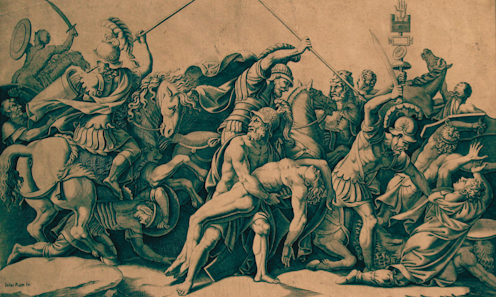Emily Wilson’s fluent new translation of the Iliad honours the epic poem’s power and beauty
- Written by Chris Mackie, Emeritus Professor of Classics, La Trobe University

A new translation of the Iliad of Homer[1] is cause for a general celebration, especially when the translator is Emily Wilson[2] of the University of Pennsylvania.
Having turned her hand to translations of other Greek and Latin texts – notably Seneca, Euripides, Oedipus Tyrannos and Homer’s Odyssey – Wilson has moved on to the Iliad, joining an exclusive club of translators of this great work that includes Richmond Lattimore[3] and Robert Fagles[4].
Review: The Iliad – Homer, translated by Emily Wilson (W.W. Norton)
This is an excellent publication where some bold decisions have been made to provide a sense of the sound and pace of the original text. As Wilson says in the translator’s note:
I wanted to honor the poem’s oral heritage with a regular and audible rhythm, and with language that would, like the original, invite reading out loud, and come to life in the mouth.
Thus, when reading Wilson’s Iliad one senses something of the chant of Homer’s verse, even through the written word.
Wilson’s book is much more than a translation. It contains a detailed introduction to the nature and dating of Homeric verse, the historical and archaeological issues of the Trojan war, the code of honour within which the Homeric heroes operate, and the broader mythical context of the war. The book could be a whole course in itself, if you wanted to make it one.
We are reminded, for instance, in a discrete section of the introduction, that the Iliad describes the destruction of Troy and the fate of its women, raped and abused by the conquering Greeks. Wilson writes that the “silencing, rape, subjugation, kidnapping and enslavement of women in war are essential instruments for the construction of male honor”.
The more one engages with the Iliad, the more one sees that it is not just a poem of immense power and beauty. It cast such a spell over antiquity that poets and artists after Homer spent much of their time engaging with it.
The Roman poet Vergil, for instance, whose epic poem the Aeneid (written about 700 years after the Iliad) was also focused on the Trojan war theme, may have known the Iliad off by heart. When we pick up Wilson’s translation we realise what a task that must have been.
Read more: Guide to the Classics: Virgil’s Aeneid[5]

















